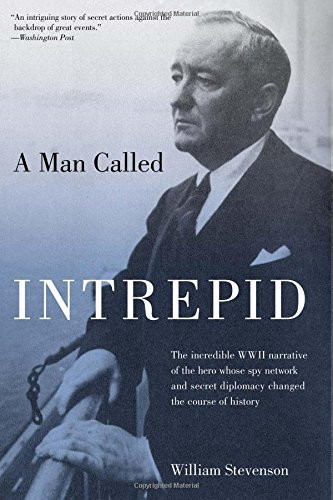World War II history has always fascinated me, although that fascination started more because of cool drawings of bombers, fighters, and half-tracks that I saw in a Richard Scarry book, Hop Aboard! Here We Go! Later, I saw the models that a couple of my uncles built, only deepening my interest in this conflict that directly impacted me via my grandparents, who lived through and fought in the war. I still think the vehicles are a pretty cool part of the war, but the history of the people and places has grown on me since my childhood. Since the scope of the war is so broad, there are many stories to tell.

A Man Called Intrepid: The Incredible WWII Narrative of the Hero Whose Spy Network and Secret Diplomacy Changed the Course of History by William Stevenson (ISBN: 978-1-59921-170-1) is the story of Sir William Stephenson, whose code name was Intrepid, a Canadian who served as the head of British Security Coordination (BSC) during World War II, which coordinated most of the UK’s espionage efforts in the Atlantic Theater, particularly with the United States, including before the U.S. was officially involved in the war. The book is long and full of all kinds of stories about things like Camp X, a training center in Canada for various clandestine operators (spies, saboteurs, guerillas, etc.), code breaking, honey pots, financial schemes, resistance efforts (including the Norwegian efforts described in more detail in the Winter Fortress), and even some more traditional spying. Intrepid, in addition to being involved in intelligence activity, was also a diplomat. His efforts were instrumental in securing U.S. and Canadian support for many of the efforts the UK was involved in. He had access to the highest levels of government, including President Roosevelt. He had to navigate inter-agency and inter-service battles, but did so largely successfully and got most of the support he needed from England’s allies, eventually leading, both directly and indirectly, to the Allied victory against the Germans. Many historians figure that without the efforts of Intrepid, the war could have gone very differently, and the book lays out that case rather convincingly. The book ends with an interesting discussion of how Intrepid would’ve preferred a more open society after the war even though clandestine activity helped the Allies secure victory.
I thought the book was very interesting and a good read. It was published in 1976, so is slightly more academic in nature than modern mass-market history (a fact that I appreciate). The intriguing information it contains hasn’t aged. Some of the code breaking and diplomacy-related sections are a little dryer, but fit into a bigger picture of a man who was clearly talented and helped change the course of history. The book doesn’t get into the philosophical or political implications of intelligence work until the very end. Many of the stories in the book can be read about in their own books. This doesn’t always have all the details, but it’s detailed enough in most instances to keep one’s attention and provide an informative read for those interested in the course of World War II. It even has a couple dozen pages of pictures.

|
This work, including all text, photographs, and other original work, is licensed under a Creative Commons Attribution-NonCommercial-NoDerivatives 4.0 International License and is copyrighted © MMXXI John Pruess. |
No comments:
Post a Comment